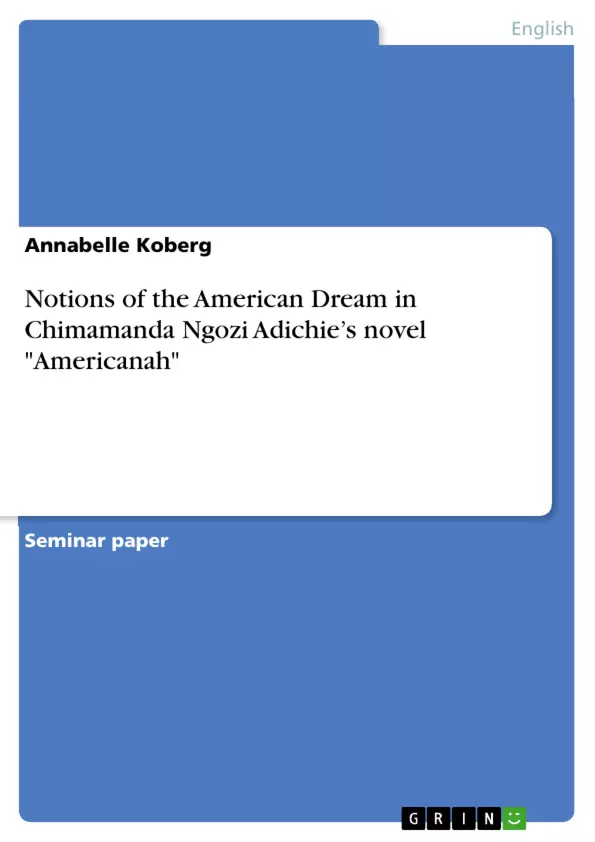The present research paper aims to prove in a first step that the American Dream acts as a leitmotif throughout the entire novel, thus showing that it is ideally suited as an object of investigation, in order to explore and discuss in a further step whether Ifemelu's American Dream can ultimately be regarded as fulfilled or disappointed, including the emphasis on important literary topoi such as race, the question of women’s rights and social matters.
Due to the paper’s given length and the particular subject chosen, the following analysis will mainly focus on Ifemelu and her experiences, as she actually leaves Nigeria for the U.S. and then comes back to her home country, thus representing the perfect research subject under the thesis of the American Dream, it’s reliving and consequences through her personae. As for Obinze, who experiences similar difficulties in the U.K., a comparison does present itself, but can only be the subject of another research paper.
Inhaltsverzeichnis (Table of Contents)
- Introduction
- Notions of the American Dream in Americanah
- American Dreaming
- Stereotypes
- Perspectives on femaleness and independency
- Outward circumstances
- Culture shock
- Race
- Poverty
- Black Femininity
- Homecoming
- Identity
- Home
- The Nigerian Dream
- American Dreaming
- Conclusion
- Works cited
Zielsetzung und Themenschwerpunkte (Objectives and Key Themes)
This paper aims to analyze the role of the American Dream in Chimamanda Ngozi Adichie's novel Americanah. By examining Ifemelu's experiences in both the United States and Nigeria, the paper explores the extent to which the American Dream is fulfilled or disappointed for her.
- The American Dream as a leitmotif throughout the novel
- The role of race and stereotypes in shaping Ifemelu's experience
- The impact of social and political circumstances on Ifemelu's pursuit of happiness
- The interplay between individual dreams and societal expectations
- Ifemelu's journey of self-discovery and identity formation
Zusammenfassung der Kapitel (Chapter Summaries)
The first part of the paper examines Ifemelu's initial motivations for leaving Nigeria, including her perceptions of the United States, her exposure to different images of women, and the social and political context that drives her decision. The second part delves into the culture shock Ifemelu experiences upon arriving in Brooklyn, focusing on the disparities between her expectations and the realities of race, poverty, and black femininity in America. The third part focuses on Ifemelu's return to Nigeria and explores the consequences of her prolonged absence, including her re-evaluation of her identity and her understanding of home.
Schlüsselwörter (Keywords)
Key terms and concepts include: American Dream, Nigerian Dream, race, stereotypes, culture shock, black femininity, identity, home, and the intersection of individual aspirations with social realities.
- Arbeit zitieren
- Annabelle Koberg (Autor:in), 2020, Notions of the American Dream in Chimamanda Ngozi Adichie’s novel "Americanah", München, GRIN Verlag, https://www.grin.com/document/990423



